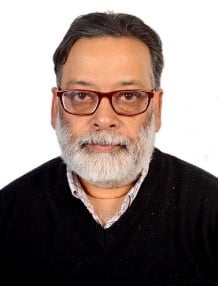REDEFINING EXPERTISE
EMJ journal author Debabrata Ghosh reflects on the importance of staying up to date with the latest research in healthcare, how COVID-19 has exposed gaps in the system, and the role EMJ has in educating society.
1. Please tell us about your field of expertise and three key highlights in your career in the last 10 years.
Over the last decade, among my many other interests, I focused on Integrative Physiology, Reproductive Biomedicine and Molecular Endocrinology. I have been working towards a better understanding of the cellular and molecular basis of primate reproduction in four cardinal areas: pre-and peri-implantation physiology, endometriosis, early placental biology and potential embryo-toxicity of antimicrobial peptides.
2. What aspects of EMJ do you think most benefit healthcare professionals in your discipline?
Healthcare professionals need to constantly work on refreshing their knowledge and stay updated on information regarding new exploration in the related fields. A good healthcare professional is also a competent follower of information vectors in the related areas.
3. Is there anything specific you have read or heard at EMJ that stands out as particularly useful?
The EMJ editorial team steers the journal to fulfil the role of helping healthcare professionals stay updated about the most recent research in their field, which renders a high number of immediate and long-term benefits to the healthcare professions. This general observation applies to my specific discipline (Reproductive Medicine) as well.
4. How do you see the future of healthcare education and what role do medical journals like EMJ play?
I remember this quote from T.S. Eliot: “Where is the knowledge we have lost in information?” Trustworthy Medical Journals like EMJ have a tremendous role in sieving information and meaningful knowledge towards medical education for all stakeholders for healthcare beyond all biases (especially geopolitical, ethnic and power blocks), as much as possible. This requires courage, commitment, dedication and unconditional respect for society.
5. In light of the COVID-19 pandemic have you noticed any changes in the way healthcare education is provided?
COVID-19 was an extraordinary situation of extensive health concerns. It exposed gaps in our medical education system – including insufficiency in healthcare management at the global level. However, there were a few interesting positive changes in the dissemination of awareness e.g. use of the digital platforms, information hunger, widespread and deep networking, etc. All these are good for medical education if used properly and in a balanced manner.
6. Fake news challenges publishers across different types of content. Do you have any experience of it? How can journals like EMJ continue to cut through?
Although I myself never faced any significantly awkward event of fake science in my career, I do imagine such events are increasing all out (including healthcare education and management) causing inconvenience and even cruel outcomes to some. Is there any easy way to cut through such social malice? I doubt it. Unless we undertake appropriate investment for interlacing character building and due appreciation of competence in the healthcare world and maybe in all walks of life and civilisation, these phantoms shall haunt us in different disguises. Journals like EMJ continue to cut through fake science in an effective way by generally inculcating character and competence building among all stakeholders.
7. It’s 10 years since EMJ launched – what do you think has been the most significant development in your field of expertise? What do you see as the main focus for the next 10 years?
I believe the most significant development in my field of Reproductive Biomedicine is the quest for redefining “expertise” in the real sense. We have learnt that a competent medical approach evolves via an integrative panorama of top-down, bottom-up and middle-out perception of a given condition. Today, we are lacking efficient tools and media to practise this method. Improvising the necessary tools and media could be a future mission of medical education. EMJ may play a pioneering role in the process.
8. Is there anything else you wish to add?
I wish to express congratulations to EMJ for completing a decade-long exploration so effectively and thank you for making me an element – albeit a small one – in the process. I further wish EMJ a glorious journey for commencing high-level healthcare science in years to come.






